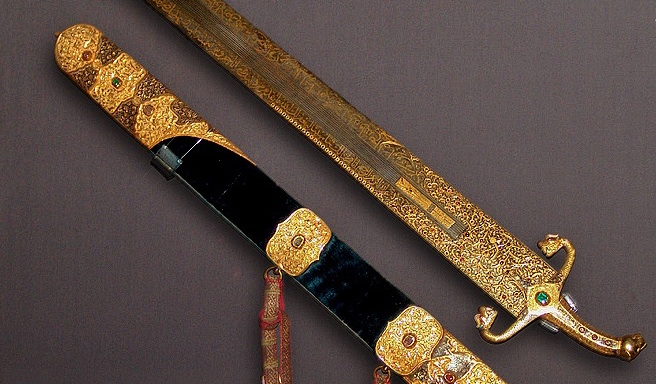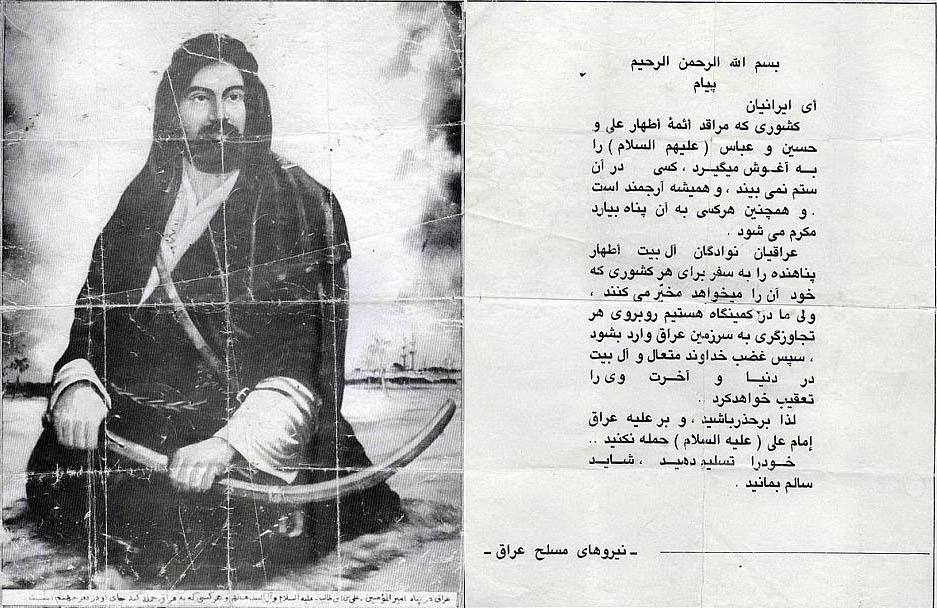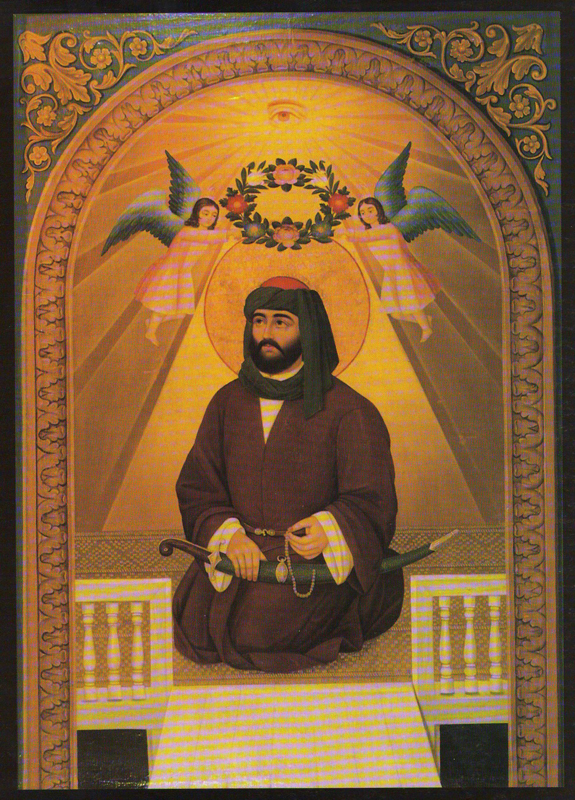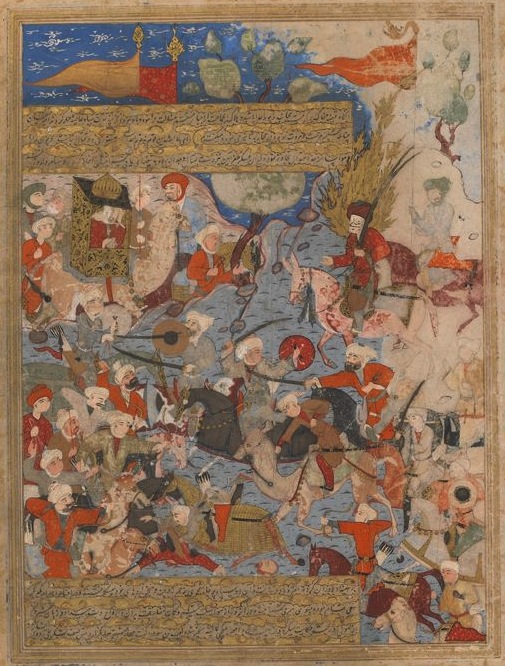Uthman was the third caliph: the third religious and political successor to the Prophet Muhammad. Uthman’s rule was contentious, his downfall ugly. It’s a fascinating case study and a terrible tragedy. The last months of his reign saw at least three factions battling for control of his empire, but all the politics was done on a very human scale, with no more than a few hundred people on each side. If you do a good job of fictionalizing it (more on that later), the situation makes solid inspiration for RPG material.

Image credit: Gatefp. Released under a CC BY-SA 3.0 license.
The position of caliph was a new one. Muhammad united the Arabian Peninsula under one religion, but also under one ruler (himself). When the Prophet died, there was no precedent for selecting who would succeed him. The first caliph – the political and religious leader of the new Islamic nation – was chosen by a conclave of the politically-influential men of Mecca and Medina (the empire’s two most important cities). The second caliph was appointed by the first. The third split the difference between the two: in 644, the dying second caliph appointed six men and ordered them to unanimously decide which among them should succeed him.
There was a sensible candidate among the six: Ali. He had all the right qualifications. He was Muhammad’s foster child, the closest thing the Prophet had to a son. He had married the Prophet’s favorite daughter. He was Muhammad’s cousin and his closest friend. He was the second convert to Islam, behind only Muhammad’s first and favorite wife. When Muhammad had to flee Mecca ahead of a band of assassins, Ali stayed behind in disguise as the Prophet to draw off the killers. He was a brave warrior, a wise philosopher, and the deputy of the second caliph, trusted to fill in for him in all matters. Who wouldn’t want Ali as caliph?
The answer, naturally, was the other five candidates. All were ambitious men. All wanted to be caliph themselves. How were they to come to a unanimous decision? It’s hard not to see the hand of pragmatism and realpolitik in the answer.
Instead of Ali, the six candidates chose Uthman, the oldest among them. Uthman was not a bad choice. He was a member of the Quraysh tribe, the same tribe as Muhammad (though a different clan within the tribe) and the most powerful tribe in Mecca. His Umayyad clan was the wealthiest among the Quraysh. While most of the Umayyads opposed Islam until very late in the game, Uthman was an early convert. He donated most of his money to the cause and rode into battle against his own kinsmen. Plus, he was the sole person who could claim to be a double son-in-law of the Prophet, having married two of Muhammad’s daughters. So he was legitimate, had close ties with the Prophet, was rich, and was very well-connected. But he was also 65 years old. With a little luck, he’d die in a few years and the five survivors could have another shot at becoming caliph.

Image credit: Petermaleh. Released under a CC BY-SA 3.0 license.
Instead, Uthman lived for twelve more years. He used the time to compile the Quran in its modern form, an impressive feat of scholarship. But he also placed relatives and cronies in powerful positions across the empire, regardless of whether they were incompetent or openly corrupt. He built an extravagant new palace in Medina and either tolerated or actively aided the funneling of incredible riches to his Umayyad relatives. He declined to enforce religious law when it was inconvenient. When one of Uthman’s half-brothers, the governor of central Iraq, got so drunk he threw up in a mosque, Uthman refused to recall or punish him. By contrast, when the son of Uthman’s predecessor was drunk in public, that caliph had his son whipped to death. For a community built on religious values and egalitarianism, Uthman’s behavior was unacceptable.
This is where we introduce another player in this story: Aisha, Muhammad’s second or third wife. She was not his favorite; that honor was reserved for Khadija, his first wife, the first convert to Islam, the mother of his children, the woman who held his head in her lap, mopped his brow, and told him she believed him after his first encounter with the archangel Gabriel. While Khadija lived, Muhammad had no other wives. But after she passed, he remarried many times (mostly to cement alliances), and Aisha was far and away his favorite among them. Her father was a dear friend of the Prophet and would be the first caliph. She was a prodigious scholar. She’s our ultimate source for over two thousand hadiths: the sayings of the Prophet, which, while not scripture the same way the Quran is, are enormously important in Muslim jurisprudence. And while Aisha bore Muhammad no children – nor did any of his other later wives, probably – she clearly made him feel happy and alive. She had a fiery and forceful personality; a later caliph quipped that “there was never a subject I wished closed she wouldn’t open, nor one I wished open that she would not close.” Muhammad spent as much time with her as he could, and after the Prophet’s death, Aisha retained extraordinary influence in the Muslim community.
Aisha and Ali did not get along. When Aisha was a young bride, she accidentally precipitated an incident that publicly embarrassed Muhammad at a very politically inconvenient time. Ali encouraged the Prophet, his best friend, to simply divorce her. Aisha never forgave the insult, and Ali never recalibrated his low opinion of her. Because Aisha and Ali were the two people closest to Muhammad, they were often in his presence together. They would bicker in front of him, causing him no end of grief. Aisha and Ali’s personal distaste would make them strange allies in the months to come.

Image credit: Mohaned Kh. Released under a CC BY-SA 3.0 license.
Aisha was publicly outraged about Uthman’s conduct as caliph. She called him a dotard, sheltered petitioners against him in her home, and wrote letters organizing support across the empire. When Uthman ordered an elderly protestor thrown out of the mosque so hard it broke his ribs, Aisha showed up at morning prayers with one of Muhammad’s sandals. “The Prophet’s sandal has not even fallen apart yet – that is how quickly you forget his example!” Prayers devolved into uproar as other worshippers brandished their sandals and condemned the retreating caliph.
Ali was more measured. He issued public warnings that “Uthman shrugs his shoulders while his brothers eat up the property of God as the camels eat up the springtime grass.” But he seems to have been reluctant to organize against the caliph. He was more concerned with maintaining the unity of the faith. That would prove ironic, since he would later become caliph and, despite his best intentions, oversee multiple Islamic civil wars.
Soon discontent flared into mutiny. Hundreds of troops marched on the capital at Medina. One of their leaders was a young man named Muhammad Abu Bakr. He was the half-brother of Aisha and adopted son of Ali, and was known for his rashness. On Muhammad Abu Bakr’s orders, the soldiers did not disperse into the city of Medina to stay with relatives. Instead, they built a military camp outside the city. Their demands were that Uthman should either curb the excesses of the Umayyads or he should resign.
Ali tried to act as mediator between Uthman and Muhammad Abu Bakr. This was a tricky position to take. Before the soldiers arrived, Ali had already gone on record as supporting the very changes they were now demanding. Muhammad Abu Bakr was Ali’s adopted son. It would be reasonable to expect Ali would work towards the soldiers’ aims. Instead, he worked towards Uthman’s. He’d pledged allegiance to the caliph, and Ali was a man of his word. Ali’s negotiations between Muhammad Abu Bakr and Uthman’s oily chief of staff went nowhere.

Two weeks later, when Uthman mounted the pulpit in the mosque for Friday prayers, the worshippers jeered him. One old man brought along a decrepit she-camel and an iron collar. He shouted an offer to collar the caliph, mount him on the she-camel, lead him to Medina’s smoldering trash dump, and leave him there. Then the parishioners started throwing pebbles at the elderly caliph. The rain of tiny stones knocked him unconscious. To his credit, Uthman ordered no retaliation. He would not be the first to spill Muslim blood. But neither did he resign.
Instead, he announced he would fire his two most controversial governors and replace one of them with Muhammad Abu Bakr. The mutineers packed up and started homewards. But three days into their journey, Muhammad Abu Bakr’s men stopped a messenger of the caliph riding hard for Egypt. They found a secret compartment in his baggage. In it was a letter bearing Uthman’s seal and addressed to the governor Muhammad Abu Bakr was to replace. The letter ordered the governor to arrest the mutineers, rip out their beards, give each 100 lashes, and imprison any who survived. The author of the letter is still uncertain, supporting any number of ‘false flag’ theories. Nonetheless, the seal was unambiguously legitimate. This was treachery!
The mutineers returned to Medina and put the palace under siege. Their goal was not to storm the palace, but to force the immediate and unconditional resignation of the caliph. Still, things didn’t look good. Ali was also betrayed by the letter. His hopes for a moderate solution to an immoderate crisis were dashed. Nonetheless, he posted his two adult sons, Hasan and Hussein, in the palace as guards for Uthman. At the same time, Aisha left Medina under the pretense of undertaking a pilgrimage to Mecca. This was a powerful endorsement of Muhammad Abu Bakr and his mutineers: whatever happened, she would not be around to stand in their way. Uthman understood her departure for what it was and sent his chief of staff to beg her to stay, as she was the only one who might be able to sway the mutineers. She refused.

The end of the story was abrupt and awful. The mutineers heard rumors that one of Uthman’s Umayyad governors was sending troops to put down the siege. If the mutineers were going to act, they’d better do it now. An old man on crutches, one of the Prophet’s earliest companions, hobbled up to the line to call on Uthman once more to abdicate. A palace aide chucked a rock at the old man and killed him. With that provocation, the mutineers stormed the palace. The guards fled. A small group of rebels led by Muhammad Abu Bakr burst into the caliph’s private chambers, where they found Uthman with his favorite wife, Naila. The caliph was reading the Quran. Muhammad Abu Bakr struck Uthman in the forehead, and then all the rebels were stabbing the caliph. Blood splashed across the pages of the Quran. Naila threw herself across her husband’s corpse, and someone accidentally cut off some of her fingers. Naila’s cry of pain finally stopped the attack.
The mutineers proclaimed Ali the new caliph. He accepted the responsibility but rejected the title – Uthman had sullied it beyond recognition. Ali preferred the title ‘imam’. Medina quickly lined up behind the new ruler. Ali refused to punish Uthman’s assassins. He neither endorsed nor condemned the assassination. Once again, he strove for unity. And once again, working for unity produced the opposite.
In Mecca, Aisha was aghast to learn what had happened. She’d wanted Uthman deposed, sure, but like this? And with Ali succeeding him? She gathered troops in Mecca to fight Ali, to seek justice for the murdered Uthman. So did Uthman’s relatives, the Umayyads, who controlled several of the empire’s most important governorships. The empire fell into a series of revolts and civil wars.
Almost all the principal actors in this story died badly. Ali was assassinated by a Kharijite, a member of a now-defunct sect of Islam that hated both sides for dividing the faith and sought to purge them both as apostates. Muhammad Abu Bakr was captured in Egypt. Umayyad soldiers sewed him into the rotting carcass of a donkey, then lit it on fire. Hasan abdicated political power and died a decade later – possibly of natural causes, possibly poisoned by a wife in the pay of the Umayyads. Hussein and a few followers were encircled by Umayyads, kept from water for ten days, massacred, and had their bodies mutilated. Aisha survived the civil wars, but her position of influence in Medina became irrelevant when the capital was moved away and the city became a backwater. Meanwhile, the Umayyad clan took over the empire and founded a hereditary monarchy that lasted almost a century.

At your table, the fall of Uthman makes good inspiration for a scenario, but – as always – you gotta fictionalize it. You gotta make each of these people a real, believable, fictional character clearly distinct from their real-world inspiration. Most of the major players are revered by one or more modern Muslim sects. There’s no need to be rude. Plus, even if you don’t care about that, the better and more thoroughly you fictionalize these characters, the better they will fit in your fictional campaign setting. You want your players to say “Wow! That scenario felt so vibrant and alive!” not “Wait, that NPC is literally just Ali with his name spelled backwards.”
In real life, the way Uthman fell produced the worst outcome possible: awful, bloody civil wars that are still causing violence and dissension more than a thousand years later. Thrust your PCs into a fictional scenario inspired by these events and encourage them to shift things in literally any other direction. Set the adventure in a capital city with mutinous soldiers camped outside. There’s not an active revolt (yet), nor is there blood in the street (yet). But things are obviously headed in an ugly direction.
Your fictional Uthman-analogue can be any kind of incompetent ruler. Customize him for your campaign by deciding whether he’s intentionally ignoring abuses, is too old and checked out to notice them, or is actively wicked. Your Aisha-analogue is his contrast. Make that NPC the opposite of whatever your Uthman-analogue is – but don’t forget her forceful personality, without which none of this makes sense. And where the real Ali was a warrior-philosopher, find a suitable analogue in your fictional setting that will keep him stuck between a rock and a hard place. Ideally, find a way to make all three related. The real Uthman and Ali were brothers-in-law, and Aisha was mother-in-law to both. This complicated not only the relationships between those three, but also with Hasan, Hussein, and Muhammad Abu Bakr.
Build your adventure as a sequence of alternating scenes. First, one of the three power players attempts to sway the party to their side. Your Ali-analogue tries to show the PCs that the real enemy is your Uthman-analogue’s corrupt relatives, not the king himself. Your Aisha-analogue tries to show that the king must be deposed peacefully and quickly before things spiral into violence. And your Uthman-analogue tries to explain that the most important thing is stability: if a handful of soldiers can expect to overthrow the monarch every time someone disagrees with government policy, the empire will never know peace.
After you run a roleplay scene with one of the power players, throw a wildcard event at the party: something unexpected that could go a lot of different ways. Examples from the real history include Aisha’s sandal speech, the arrival of Muhammad Abu Bakr’s soldiers, worshippers knocking out Uthman in the mosque, the discovery of the secret letter, and the soldiers storming the palace. Have the PCs witness or get caught up in this wildcard event, and let them influence how it turns out. If the PCs are at least moderately influential people in your fictional setting, their intervention might break the three-way stalemate before it turns awful.
Source: After the Prophet by Lesley Hazleton (2009)
It’s worth noting that one sect or another disagrees with virtually every single word of the above – history gets contentious when it backs up religious truth. I’ve done my level best not to take sides, but you may feel differently. If so, I’d love to hear from you! Hit me up at the ‘contact’ link at the top of the page.






